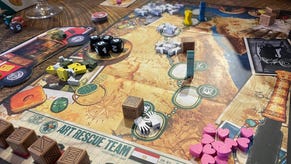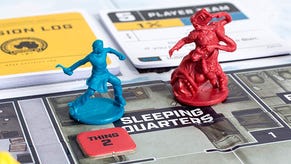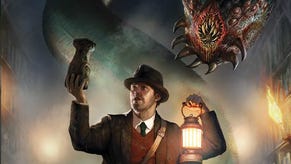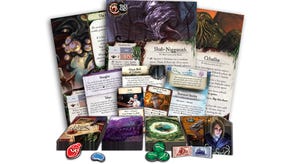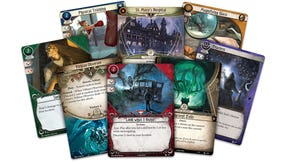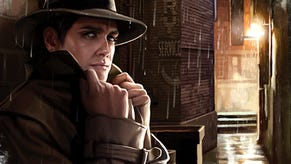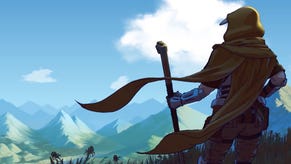How to play Arkham Horror: The Card Game: Getting started with the LCG
Get eldritch or die trying.
Arkham Horror: The Card Game is a fascinating monster. It condenses the grand thrills and oppressive terrors of investigating, fleeing or surviving the unknowable forces of a Lovecraftian universe into a few decks of cards.
You choose an investigator to play as, complete with unique abilities and weaknesses. That investigator builds into your own custom deck of allies, tools and skills. With deck in hand, you'll step forth and strive to solve a horrible mystery while fending off uncanny threats.
For all that it has in terms of gameplay depth, it’s not too complicated to learn how to play Arkham Horror: The Card Game. All you need to get started is the core set, and a buddy or three if you want company - though it can be played as a solo board game. The rules include instructions on how to create starter decks for your investigators, and walk you through the setup of your first game.
While the living card game says you need two core sets to work with four players, with some slightly creative deck construction it’s entirely possible to get four working decks from a single core set.
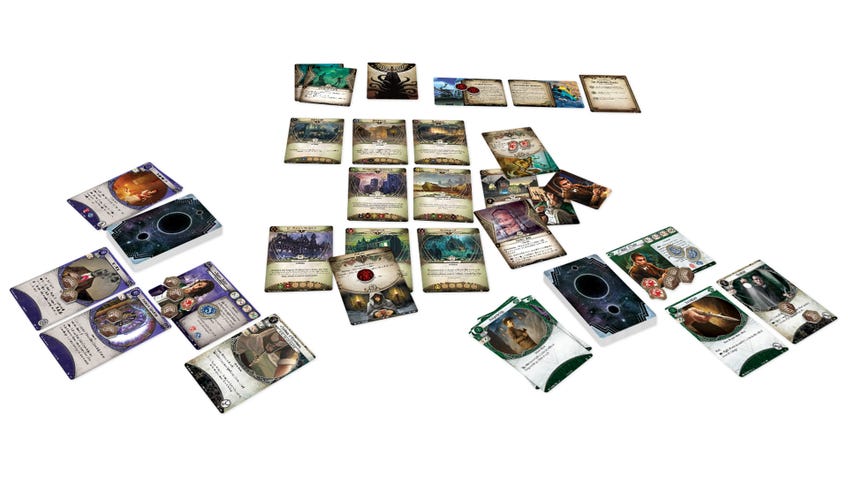
What’s a living card game?
Living card games are publisher Fantasy Flight’s solution to how to improve the format of collectible and trading card games. In TCGs and CCGs such as Magic: The Gathering new content is regularly released, usually in randomised booster packs. Every pack bristles with the possibility of finding rare or powerful cards, but there's no guarantee of ever getting what you want without mass-buying boosters or purchasing individual cards on the secondary card market.
Much like CCGs, LCGs have regular packs full of new content. The difference is simple: you always know what is in an LCG pack, as every expansion includes the same cards. No randomness, no differing rarity. This means that while investing in an LCG won’t be cheap, it won’t be nearly as expensive as a traditional CCG habit.
What is the Arkham Horror Files series?
Originating with the Arkham Horror board game, the Arkham Horror Files is a shared universe that has grown to include a variety of horror board games such as Mansions of Madness, Elder Sign and Eldritch Horror, and even a number of tie-in novellas.
Set in an alternate 1920s America, the Arkham Horror Files fiction is one of pulp noir, teeming with bootlegging, new industry, prohibition and intrigue. But it is also filled with the strange and uncanny, with weird cults, obsessive academics and hapless fools all delving where they should not with terrible consequences.
In short, it is Lovecraftian cosmic horror writ large. Unpronounceable gods and unknowable horrors lurk just an inch beyond reality, and everyone keeps trying to invite them in.

How do you play Arkham Horror: The Card Game?
In essence, every game of Arkham Horror: The Card Game is a race. While the place, story and aim might be different, two things are always important: the act and agenda. On one side you have your act deck, a plot you and your co-conspirators are trying to advance, often by scrambling to discover enough clues. On the other hand is the terrifying agenda: a ticking clock that accrues doom each round until the current card can advance, bringing further complications as bad things happen. When either deck runs out, win or lose, your game is done.
Applying constant pressure in this race is the encounter deck, a mysterious collection of horrible things that you draw from every round. Monsters, curses and terrors await, and you never know exactly what is in store. During all of this your investigators will be constantly fighting to keep pace as you search for clues, fend off ghouls and try to survive.
Regardless of what you are trying to do, the central gameplay is the same, consisting of using actions to move between locations, investigate clues, interact and resolve tests using the chaos bag, which is full of different tokens. Like several elements of the Arkham Horror LCG, the chaos bag can change depending on the difficulty you choose and the choices you make in a campaign.
Let’s say you want to find clues and, between the choice of locked schoolhouse, animal graveyard and abandoned church, decide to head to the church. You spend two actions going from the dusty pathway, to the miserable village, to the abandoned church. You have one action left, which you spend on investigating. The abandoned church has a ‘shroud’ value of four, so you need a total of four or higher to succeed. Your investigator Daisy Walker has an intelligence of five, which is what you use to investigate. You want to be sure of your success, so you play a card from your hand, discarding it for a +1 to intelligence. You reach into the chaos bag - what you draw determines whether you pass or fail, and to what degree.
Beyond the core mechanic of drawing from the bag to resolve investigating, fighting, evading and more, the control you have over how you play is one of the best parts of the game. The skills your investigator excels at and tricks they can pull will be very different from the rest of the party. It leads to a feeling of trust and dependency as another player says, “Don’t worry, I can deal with these three monsters,” as you run around holding nothing but a book and a magnifying glass.
You won’t always win. Your failures are as much a part of the game as your successes. Losing a scenario doesn’t always mean you try again; the consequences of failing can become woven into a larger campaign as you struggle ever on against those impossible odds.

How do you build a deck for the Arkham Horror LCG?
First you choose what investigator you want to be. Do you want to be Agnes Baker, cocktail waitress - and sorceress - or are you ‘Skids’ O’Toole, the seasoned criminal? Each investigator gives you a selection of general skills and abilities, as well as their own unique cards.
Who you play as determines what kind of cards can be built into your deck, as well as how many. There are five classes of investigator and five corresponding classes of card, along with a number of neutral cards for everyone. These are further split into assets - cards which stay in play - one-shot events and skills, which are only played to boost tests.
How you make your choices between different card classes and types can depend on a combination of your specific investigator's deck restrictions and your personal playstyle. Roland Banks’ deck might be 30 cards and loaded with assets: guns, allies, and bulletproof vests. Meanwhile, Sefina Rousseau’s deck may have 33 cards split between events and skills, allowing you to react with a range of surprises and rule-bending spells. It really is up to you.
What are the Arkham Horror LCG expansions?
If Arkham Horror: The Card Game is for you you may well want to look into playing one of its campaigns after you’ve completed the scenarios in the core set. Each one begins with a deluxe expansion, providing new investigators, new cards and at least two scenarios to begin the campaign. The rest of the campaign is then released as six smaller mythos packs, eventually forming a complete campaign arc. There’s a lot to choose from:
The Dunwich Legacy
The first deluxe expansion and campaign released - and still the best big campaign to start with - The Dunwich Legacy gives you a classic tale of mystery and growing horror. It introduces some highly memorable scenarios and consistently delivers a top-notch experience of dread, including mechanics that tilt your own deck against you.
The Path to Carcosa
Using the tales of The King in Yellow author Robert W. Chambers as inspiration, this campaign suitable for players of any experience level manages to be strangely beguiling as it fills your games with an enemy that follows you no matter how much you defeat it, while the players face decisions that might fill them with conviction or doubt as they second-guess every event that happens. It also introduces a delicious mechanic with ‘hidden’ cards, which put negative cards into your hand that you are not allowed to reveal to your companions.
The Forgotten Age
This campaign is where Arkham Horror: The Card Game really stretches its wings and takes some risks. Set largely in the jungles of South America, this campaign has strong pulp adventure vibes, complete with ancient civilisations and lost temples. It introduces an exploration deck which adds a new layer to play as locations emerge in unpredictable orders, and a vengeance mechanic which incentivises players to not kill certain enemies. It also stretches to include three concurrent act decks, making it an ambitious, complex campaign that’s not recommended for beginners.
The Circle Undone
The first campaign to feature a prequel mission, The Circle Undone reeks of mystery to its roots. Playing on themes of secret societies, witches, tarot and fate, this campaign bounces players back and forth between mysteries through its scenarios. It introduces tarot cards as a new kind of item for investigators, while the haunt mechanic makes searching for clues a dreaded risk. With some of the most rewarding and satisfying writing and story, this campaign is top of the list for players who want to be immersed in the world of Arkham Horror.
The Dream-Eaters
The Dream-Eaters sees the Arkham Horror LCG take risks in a new way, with two separate but intertwining stories: one in the waking world and another in the dream world. This means the campaign can be played in multiple different ways; you can play one half of the campaign following a single story, play both halves with each player controlling different investigators or have two seperate groups, each playing half of the campaign separately.


